 Today is the feast day of St John Baptiste Vianney or more affectionately remembered as "The Cure of Ars" What makes this particular feast day so special is 150th anniversary of his death and entrance into Eternal Life on this day, in this year, The Year of the Priest.
Today is the feast day of St John Baptiste Vianney or more affectionately remembered as "The Cure of Ars" What makes this particular feast day so special is 150th anniversary of his death and entrance into Eternal Life on this day, in this year, The Year of the Priest.Today is also one of the indulgenced days in The Year of the Priest which are as follows:
(A) All truly penitent priests who, on any day, devotedly pray Lauds or Vespers before the Blessed Sacrament exposed to public adoration or in the tabernacle, and ... offer themselves with a ready and generous heart for the celebration of the Sacraments, especially the Sacrament of Penance, will be granted a Plenary Indulgence, which they can also apply to their deceased confreres, if in accordance with current norms they take Sacramental Confession and the Eucharist and pray in accordance with the intentions of the Supreme Pontiff. Priests are furthermore granted a Partial Indulgence, also applicable to deceased confreres, every time they devotedly recite the prayers duly approved to lead a saintly life and to carry out the duties entrusted to them.
(B) All truly penitent Christian faithful who, in church or oratory, devotedly attend Holy Mass and offer prayers to Jesus Christ, supreme and eternal Priest, for the priests of the Church, or perform any good work to sanctify and mold them to His Heart, are granted a Plenary Indulgence, on the condition that they have expiated their sins through Sacramental Confession and prayed in accordance with the intentions of the Supreme Pontiff. This may be done on the opening and closing days of the Year of Priests, on the 150th anniversary of the death of St. Jean Marie Vianney, on the first Thursday of the month, or on any other day established by the ordinaries of particular places for the good of the faithful.
The elderly, the sick and all those who for any legitimate reason are unable to leave their homes, may still obtain a plenary indulgence if, with the soul completely removed from attachment to any form of sin and with the intention of observing, as soon as they can, the usual three conditions, "on the days concerned, they pray for the sanctification of priests and offer their sickness and suffering to God through Mary, Queen of the Apostles."
Additionally, a partial indulgence will be offered to the faithful each time they pray five “Our Father,” “Hail Mary” and “Glory Be,” or any other duly approved prayer "in honor of the Sacred Heart of Jesus, to ask that priests maintain purity and sanctity of life."
Below is a simply wonderful rendition of the life of the Cure of Ars, I highly recommend you print it up and make it part of your celebration and rememberance of St John Vianney today, I will be making it a family read-aloud, incredibly edifying reading! Later today I hope to share with you our activities and feasting in the home for this truly wonderful occasion! St John Vianney, Patron of Parish Priests
St John Vianney, Patron of Parish PriestsJean Marie Baptiste Vianney was a religious personality of unusual force. To the incomparable exclusion of everything else he addressed himself to the greater honor and glory of God and the salvation of souls. He accepted his obligation to holiness at an early age, and it took complete possession of him. Every word he uttered was spoken out of the world of religiousness. He brought to a conclusion an achievement which it would be hard for anyone to imitate. From this man there emanated an influence which cannot be overlooked, and the results of which cannot be contested.
St. John Vianney’s mother was a woman of great piety, and she led him into the way of religion at an early age. “I owe a debt to my mother,” he said, and added, “virtues go easily from mothers into the hearts of their children, who willingly do what they see being done.” He was a good-natured boy, with blue eyes and brown hair. In spite of his lively disposition, he admitted much later on in life that “when I was young, I did not know evil. I was first acquainted with it in the confessional, from the mouths of sinners.”
It was only after much toil and trouble that St. John Vianney was admitted to the priesthood. At the age of 20, he was having great difficulty in his studies for the priesthood. Mathias Loras, perhaps the most intelligent of Jean-Marie’s fellow seminarians, who was assigned to help him in his lessons, was of a nervous and excitable temperament. One day his patience was exhausted by the sheer incapacity of the big young man, and he boxed his ears before all the others. Jean-Marie was also excitable, but he knelt down before the boy of twelve who had treated him so outrageously and humbly asked his forgiveness. Mathias had a golden heart. Suddenly he felt smitten with grief and, his face bathed in tears, he threw himself into the arms of Jean-Marie who was still on his knees. This incident marked the beginning of an abiding friendship. Mathias Loras subsequently became a missionary in the United States, and eventually Bishop of Dubuque, but never could he forget the action of Jean-Marie and the accent with which he spoke on that occasion.
In his assignment as parish priest of Ars, St. John achieved something which many priests would like to have done, but which is scarcely granted to any. Not over night, but little by little, the tiny hamlet underwent a change. The people of Ars were unable to remain aloof for long from the grace which radiated from the remarkable personality of their priest. When a man attacks inveterate disorders and popular vices, he challenges opposition. St. John was not unprepared – he knew the enemy would raise his head. “If a priest is determined not to lose his soul,” he exclaimed, “so soon as any disorder arises in the parish, he must trample underfoot all human considerations as well as the fear of the contempt and hatred of his people. He must not allow anything to bar his way in the discharge of duty, even were he certain of being murdered on coming down from the pulpit. A pastor who wants to do his duty must keep his sword in hand at all times. Did not St. Paul himself write to the faithful of Corinth: ‘I most gladly will spend and be spent myself for your souls, although loving you more, I be loved less.’”
In his early sermons, he thundered against the prevalent vices of the village of Ars: Blasphemies, cursing, profanation of Sundays, dances and gatherings at taverns, immodest songs and conversations. “The tavern,” he would say, “is the devil’s own shop, the school where hell retails its dogmas, the market where souls are bartered, the placed where families are broken up, where health is undermined, where quarrels are started and murders committed.”
Saint John Marie would never consider Ars converted until all of the 200 villagers were living up to the ten commandments of God, the six precepts of the Church and the fulfillment of their duties in life. Was this asking too much in exchange for Heaven? Complete enforcement of the third commandment took eight long years. "You labor, but what you earn proves the ruin of your soul and your body. If we ask those who work on Sunday, 'What have you been doing?' they might answer: 'I have been selling my soul to the devil and crucifying our Lord... I am doomed to hell...' When I behold people driving carts on Sunday, it seems to me I see them carting their souls to Hell."
Undoubtedly though, the most heinous crime in the eyes of this saint, the one that made him weep whenever he heard it or spoke against it, was the taking of the most Holy Name of Jesus in vain. He used to say that it was an astounding miracle that people who did this were not struck dead on the spot. But he warned them, "If the sin of blasphemy is rampant in your home, it will surely perish." Modesty was absolutely required, not only when in church but at all times – no low necks or bare arms.
It took St. John Vianney ten whole years to renew Ars, but the community changed so noticeably and to such an extent that it was observed even by outsiders. There was no more working on Sundays, the church was filled more and more every year, and drunkenness fell off. In the end the taverns had to close their doors since they had no more customers; and even domestic squabbles abated. Honesty became the principal characteristic. "Ars is no longer Ars," as St. John Vianney himself wrote; for it had undergone a fundamental change. Under his guidance the little village became a community of pious people, to whom all his labors were directed. He delighted in teaching the children their catechism and he did this daily. After a while the grown-ups came too and he found that those who were children during the Revolution were in complete ignorance of their religious duties. He taught the people love for the rosary and wanted everyone to carry one around at all times. It is truly astounding to reflect upon what St. John Vianney, with a staff of trained assistants, was able to achieve in the village in the space of a few years. What an immense amount of endeavor underlay his work will best be appreciated by anyone who has had to convert only a few drunkards to sanity.
Jean-Marie sanctified himself whilst at work in the field or in the house. The supernatural world was ever present to him, but for all that he was neither a slacker nor a dreamer, his being a healthy and active temperament. “O what a beautiful thing it is to do all things in union with the good God!” he would say. “Courage, my soul, if you work with God, you shall, indeed, do the work, but He will bless it. You shall walk and He will bless your steps. Everything shall be taken account of – the forgoing of a look, of some gratification – all shall be recorded. There are people who make capital out of everything, even the winter. If it is cold they offer their little sufferings to God. Oh! What a beautiful thing it is to offer oneself, each morning, as a victim to God!”
In letters of consolation to a cousin, Frère Chalovet, whom obedience had sent to the Hotel-Dieu of Lyons and who was greatly tempted, he wrote: “My good friend, I write these lines in haste to tell you not to leave, in spite of all the trials that the good God wishes you to endure. Take courage! Heaven is rich enough to reward you. Remember that the evils of this world are the lot of good Christians. You are going through a kind of martyrdom. But what a happiness for you to be a martyr of charity! Do not lose so beautiful a crown. ‘Blessed are they that suffer persecution for my sake,’ says Jesus Christ, our model. Farewell, my most dear friend. Persevere along the way on which you have so happily entered and we shall see each other again in heaven...” “Courage my good cousin! Soon we shall see it, our beautiful heaven. Soon there will be no more cross for us! What divine bliss! To see that good Jesus Who has loved us so much and Who will make us so happy!”
Often when the Curé was returning to Ars from missionary expeditions, Mayor Mandy, who was anxious about the safety of his holy pastor, would send his son Antoine to accompany him on his journey home. “Even amid the snows and cold of winter,” Antoine afterwards related, “we rarely took the shortest and best road. M. le Curé had invariably to visit some sick person. Yet the tramp never seemed really long, for the servant of God well knew how to shorten it by relating most interesting episodes from the lives of the saints. If I happened to make some remark about the sharpness of the cold or the ruggedness of the roads, he was always ready with an answer: ‘My friend, the saints have suffered far more; let us offer it all to the good God.’ When he ceased from speaking of holy things we began the Rosary. Even today I still cherish the memory of those holy conversations.”
St. John Vianney had loved Mary from the cradle. As a priest he had exerted all his energy in spreading her glory. To convince themselves of it, the pilgrims had but to look at the small statues of her that adorned the front of every house in the village. In each home there was also a colored picture of the Mother of God, presented and signed by M. le Curé. In 1814 he had erected a large statue of Mary Immaculate on the pediment of his church. Eight years earlier, on May 1, 1836, he had dedicated his parish to Mary Conceived Without Sin. The picture which perpetuates this consecration, says Catherine Lassagne, is placed at the entrance to our Lady’s Chapel. Shortly afterwards he ordered a heart to be made, in vermeil (color), which is, even to this day, suspended from the neck of the miraculous Virgin. This heart contains the names of all the parishioners of Ars, written on a white silk ribbon. On the feasts of Our Lady, Communions were numerous, and the church was never empty. On the evenings of those festivals the nave and the side chapels could barely contain the congregation, for no one wished to miss M. Vianney's homily in honor of Our Blessed Lady. The hearers were enthralled by the enthusiasm with which he spoke of the holiness, the power, and the love of the Mother of God.
The explanation of this mysterious transformation of the village of Ars can only be grasped in the remarkable manner that this simple priest realized that a man must always begin with himself, and that even the rebirth of a community can only be achieved by its renewing itself. We must expect nothing of men which is not already embodied within them. On the basis of this perception St. John Vianney set to work, in the first place, upon himself, so that he could attain the ideal which he demanded of his parishioners in his own person. He took his own religious obligations with the greatest seriousness, and did not care whether the people noticed this or not. And finally the inhabitants of Ars said to each other: "Our priest always does what he says himself; he practices what he preaches. Never have we seen him allow himself any form of relaxation."
The priest of Ars subjected himself to a strict fast. In this way he sought to reduce the requirements of his life to minimum. One meal sufficed him for the whole day. He abstained from alcohol except wine at holy Mass and normally ate only a little black bread and one or two potatoes cooked in water: he would prepare sufficient of these to last him the whole week, keeping them in an earthenware pan, and often they were covered with a coating of mold. Frequently he fasted for a whole day until, overcome, he would collapse from physical weakness. In view of this mode of life he had no need, of course, of a housekeeper – apart from the fact that his house stood almost empty anyway. Since he considered that his self-mortification was all too inadequate, he had a special penitential garment made, which he wore next to his skin, and which, by reason of the constant friction against his body, was soon stained a reddish brown. For the most part he slept on a bare mattress when he was not sleeping on a bundle of wood down in the cellar.
St. John Vianney’s assiduity in the confessional and the hardships entailed thereby would, of themselves, have sufficed to raise him to high sanctity. However, he thirsted for mortifications as others thirst for pleasure, and he never had his fill of penance. He laid on himself the sacrifice never to enjoy the fragrance of a flower, never to taste fruit nor to drink, were it only a few drops of water, during the height of the summer heat. He would not brush away a fly that importuned him. When on his knees he would not rest his elbows on the kneeling bench. He had made a law unto himself never to show any dislike, and to hide all natural repugnances. He mortified the most legitimate curiosity: thus he never expressed so much as a wish to see the railway which passed by Ars at a distance of a few kilometers, and which daily brought him so many visitors. During the whole of his priestly life he never indulged in any light reading, not even that of a newspaper. The Annals of the Propagation of the Faith are the only periodical that he ever perused.
Regarding mortification, he once said, “My friend, the devil is not greatly afraid of the discipline and other instruments of penance. That which beats him is the curtailment of one’s food, drink and sleep. There is nothing the devil fears more, consequently, nothing is more pleasing to God. Oh! How often have I experienced it! Whilst I was alone – and I was alone during eight or nine years, and therefore quite free to yield to my attraction – it happened at times that I refrained from food for entire days. On those occasions I obtained, both for myself and for others, whatsoever I asked of Almighty God.”
St. John Vianney read much and often the lives of the saints, and became so impressed by their holy lives that he wanted for himself and others to follow their wonderful examples. The ideal of holiness enchanted him. This was the theme which underlay his sermons. “We must practice mortification. For this is the path which all the Saints have followed,” he said from the pulpit. He placed himself in that great tradition which leads the way to holiness through personal sacrifice. “If we are not now saints, it is a great misfortune for us: therefore we must be so. As long as we have no love in our hearts, we shall never be Saints.” The Saint, to him, was not an exceptional man before whom we should marvel, but a possibility which was open to all Catholics.
Unmistakably did he declare in his sermons that “to be a Christian and to live in sin is a monstrous contradiction. A Christian must be holy.” With his Christian simplicity he had clearly thought much on these things and understood them by divine inspiration, while they are usually denied to the understanding of educated men.
The conversion of the whole parish was too unusual an occurrence for it to remain unknown. From the year 1827, there began the famous stream of pilgrims to Ars. People went to Ars from all parts of France, from Belgium, from England and even from America. The principal motive which led all these crowds of pilgrims to the priest of Ars was purely the desire for him to hear their confession and to receive spiritual counsel from him. They were driven to his thronged confessional by the longing to meet once and for all the priest who knew all about the reality of the soul. The priest of Ars possessed the ability to see the human soul in its nakedness, freed of its body. This grace is only rarely bestowed on men. He never put his nose into the spiritual affairs of other people. He was entirely free from inquisitiveness. Like St. Francis de Sales, he had the gift of "seeing everything and not looking at anyone."
In confessing people this holy man, who had a fundamental knowledge of sin, strove after one thing only – to save souls. This was his ardent desire, and for the sake of it he suffered all the tortures of his daylong confinement in the confessional. This great saint heard confessions from 13 to 17 hours a day, and could tell a penitent's sins even when they were withheld. In order to save souls one must be possessed of that holy love of men which consumed the priest of Ars. He would often weep in the confessional and when he was asked why he wept, he would reply: "My friend, I weep because you do not weep."
“The great miracle of the Curé d'Ars,” someone has said, “was his confessional, besieged day and night.” It might be said with equal truth that his greatest miracle was the conversion of sinners: “I have seen numerous and remarkable ones,” the Abbé Raymond assures us, “and they form the most beautiful chapter of the life of the Curé d'Ars. ‘Oh, my friend,’ he often told me, 'only at the last judgment will it become known how many souls have here found their salvation.’” “In reality,” Jeanne-Marie Chanay writes, “he made but small account of miraculous cures. ‘The body is so very little,’ he used to repeat. That which truly filled him with joy was the return of souls to God.” How many occasions he had for such joy! M. Prosper des Garets relates: “I asked him one day how many big sinners he had converted in the course of the year. ‘Over seven hundred,’ was his reply.” Hence it is easy to understand the wish expressed by a Curé who made the pilgrimage to Ars: “Those of my parishioners who go to M. Vianney become models. I wish I could take my whole parish to him.”
One day, under the pretext of sending him on an errand, the Baronne de Belvey dispatched to M. Vianney a hardened sinner, who only set foot in the church at Christmas and Easter. It would seem that he had not been to confession since his first Communion. “How long is it since you were last at Confession?”, M. le Curé asked. “Oh, forty years.” “Forty-four,” the saint replied. The man took a pencil and made a hasty calculation on the plastering of the wall. “Yes, it is quite true,” he admitted, overcome with amazement. The sinner was converted and died a good death.
St. John Vianney possessed the gift of being able to understand the soul of a man in an instant, and, without any lengthy explanations, to feel at once what spiritual trouble was afflicting it. He had a clear sighted vision which often enabled him to foretell to a man what would happen to him in the future. This gift of God overpowered the people who visited his confessional, and to whom he granted a word of pardon. The words and advice of the Curé were like darts; they penetrated deeply. He said little, but his little was enough. To a priest who complained about the indifference of people in his parish, St. John Vianney answered: "You have preached, you have prayed, but have you fasted? Have you taken the discipline (a self imposed scourge)? Have you slept on the floor? So long as you have done none of these things, you have no right to complain." To a mother of a large family, who was expecting another child, he said with fatherly kindness and consideration: "Be comforted, my child. If you only knew the women who will go to Hell because they did not bring into the world the children they should have given to it." Miracles are signs of divine approval, though sanctity may exist without them. Had he wrought not a single miracle, the Curé d'Ars would yet call for our admiration. His life was in itself a daily prodigy. Ribadeneira, writing of St. Bernard in that volume of the Lives of the Saints which the Curé d'Ars was forever reading, says that “the Abbot of Clairvaux was himself the first and greatest of all his miracles.” This sentiment of the old hagiographer has been reechoed with no less felicity by one of M. Vianney's contemporaries – namely, the worthy Jean Peretinand, the village schoolmaster, who was likewise the saint's friend and his occasional nurse. “The most arduous, most extraordinary and most prodigious work that the Curé d'Ars accomplished was his own life.” And his neighbor of Fareins, the Abbé Dubouis, declares that “without supernatural assistance M. Vianney would have sunk under the crushing weight of his work.” “It is humanly inconceivable that, for the space of thirty years, he should have been equal to a task under the weight of which any other priest, however strong he might have been, would have quickly succumbed," says Canon Gardette. “He was visibly helped by God,” is the attestation of Père Faivre. In conclusion we quote the opinion of one of the physicians who attended the holy Curé: “Knowing, as I do, his mode of life, I look upon his existence as extraordinary and beyond the range of a natural explanation,” was the verdict of Doctor Michel, of Coligny. Hence we may conclude in the words of Paul Bourget: “No, the era of miracles is not over, but to produce them saints are required – and they are too few.”
In the Process of his canonization, Mgr. Mermod, who was Curé of Gex at the time, relates the following incident: “An incorrigible drunkard of Chaleins, my former parish, was converted by M. Vianney. During the three years that he lived afterwards that man never drank a drop of wine, and led an exemplary life. Now a striking thing happened. One day the good man called at the priest's residence; he was quite well, yet he wished to go to confession, giving as his reason that he was going to die. As he persisted in his request, I gave him absolution and Holy Communion. An hour later he was dead.”
Mlle. Claudine Venet, of Viregneux, a small village of the canton of Saint-Galmier, in the Loire, was taken to Ars on February 1, 1850. In consequence of an attack of brain fever, she had become completely deaf and blind. M. Vianney had never seen her; no one had introduced her to him. On that February 1, she happened to be standing outside the church as he went by. Without speaking a word, he took her hand, led her into the sacristy and made her kneel down in the confessional. He had hardly given her his blessing when her sight and hearing returned. It seemed to her that she had awakened from a long dream. After her confession, the servant of God made the following amazing prophecy: “Your eyes are healed, but you will become deaf for another twelve years. It is God's will that it should be so!” On leaving the sacristy, Claudine Venet felt her ears closing once more. As a matter of fact, she could no longer hear anything. The infirmity lasted twelve years as foretold on this February 1, 1850. Calm and resigned, enjoying the sight that had been restored to her, the stricken woman awaited the day of her deliverance. Great was her emotion when, on January 18, 1862, she felt perfectly cured.
In 1854, a girl of Montchanin (Saone-et-Loire) of the name of Farnier, came to Ars to beg from M. Vianney the cure of her paralyzed leg. “My child,” the saint told her, “you disobey your mother far too often, and answer her back in a disrespectful manner. If you wish the good God to cure you, you must correct that ugly defect. Oh! what a task lies before you! But remember one thing: you will indeed get well, but by degrees, according as you try to correct that defect.” As soon as Mlle. Farnier returned home she endeavored to show more obedience and respect to her mother. Her crippled leg, which had been four inches shorter than the other, insensibly grew longer, and at the end of a few years her infirmity had wholly vanished.
His cousin, Marguerite Humbert, came one day to beg his prayers for one of her little daughters who was dangerously ill. “She is ripe for heaven,” he said without hesitation. “As for you, my cousin, you need crosses to make you think of God.” Françoise Lebeau, a poor girl of Saint-Martin-de-Commune in the Saoneet-Loire, had become quite blind. She went with her mother on a pilgrimage to Ars. They begged their bread the whole way and slept in stables or sheds. To this poor girl M. Vianney did not fear to disclose something of the divine mystery of suffering, for his inspired gaze had fathomed her valiant spirit. “My child,” he said, “you can be cured, but if the good God restores your sight, your salvation will be less assured; if, on the contrary, you consent to keep your infirmity, you will go to heaven, and I even guarantee that you will have a high place there.” The blind girl understood; she no longer asked for a cure and left Ars in a state of perfect resignation to God's will. Nor had M. Vianney the courage to pity the mothers whose children died in infancy. “I had the misfortune to lose one of my children aged five years,” relates Mme. des Garets. “This is what M. Vianney replied to my brother-in-law who brought the news to him: ‘Happy mother, happy child! What a grace for both of them! How is it that this innocent little one has merited that its time of probation should have been shortened, to enable it to enter so soon into eternal bliss?’” Even in the purely material order Ars appeared to be under a special protection. “I have heard my mother say,” Madeleine Mandy-Scripiot relates, “that since 1825, the year she came to live in the parish, until the death of M. Vianney, there never was a hailstorm. She ascribed this protection to the merits of the servant of God, the more so as he himself was in the habit of asking for prayers that we might be spared the scourge. “ “It has been remarked, “ Mlle. Marthe des Garets adds, “that during the whole time of his ministry at Ars (41 years) no damage was ever done by storms.”
Other supernatural favors also – such as are met with in the lives of the greatest mystics – fell to the lot of the Curé d'Ars. Thus he received in a plentiful measure the gift of tears. According to St. Teresa, these tears spring from a sentiment of ineffable tenderness towards God, or from the interior martyrdom endured by the soul when it sees God being offended. “Those tears are caused by God and shed in ecstasy,” Lacordaire writes. M. Vianney could never speak of sin and sinners without shedding tears. He sobbed all the time he was making the Stations of the Cross. When he distributed Holy Communion, tears would often trickle down upon his chasuble. In the last years of his life in particular, he could never preach about the Eucharist, the goodness and love of God, the happiness of heaven – those were his favorite topics – without being stopped by his tears.
Those who were in the closest contact with him, those who were most intimate with him were the first to proclaim his sanctity. “They never discovered in his conduct a deliberate venial sin,” says a priest of Ars. We have testimony of the Abbe Louis Beau, Curé of Jasans, who knew the saint more intimately than anyone else as he was his confessor during the last thirteen years of his life: “I do not think that he slackened his effort for as much as a day. He discharged his duties as a priest and pastor with admirable delicacy of conscience and he persevered until death in a strict fulfillment of all his duties. I particularly noticed the manner in which he made the sign of the cross, recited grace before meals and the Ave Maria when the hour struck. I am still deeply moved by the remembrance of what I witnessed on those occasions. With what angelic piety he recited his Breviary! I cannot find words to express myself. I do not think it is possible to go any further in the practice of heroic virtues. When I read the Lives of the Saints I fail to discover in them anything exceeding that which I have witnessed in M. le Curé d’Ars. He was surrounded by a halo of sanctity. I cannot express with how much veneration and respect for his person he inspired me. It is my opinion that he had preserved the grace of his baptism, and to that grace he was constantly adding by the eminent sanctity of his life.”
On Aug. 4, 1859, Fr. John Vianney gave up his soul to God. He had been parish priest of Ars for 41 years. In 1925, he received the highest honor of the Church by being canonized and placed in the index of the Saints. Today over 500,000 people visit every year this simple farming town where they come to see the incorrupt body of one of the greatest saints in the history of the Church. The life of St. John Vianney is the story of a humble and holy man who barely succeeded in becoming a priest, but who converted thousands of sinners.




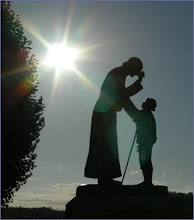
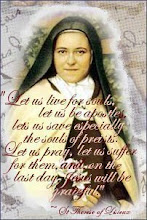



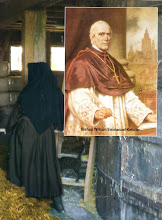
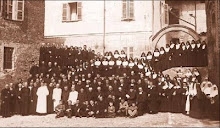


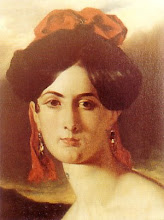








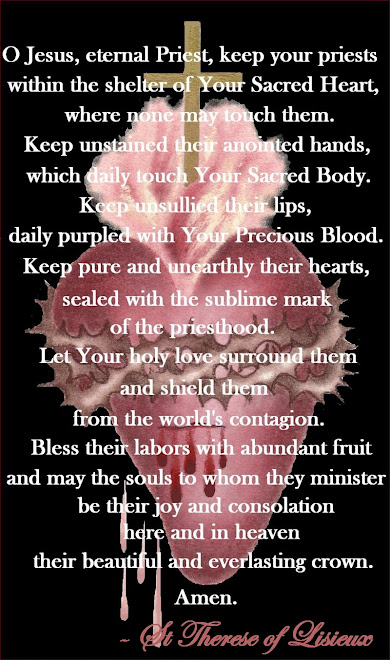
3 comments:
Excellent, I love all those wonderful ideas.
val
A wonderful, wonderful story! So inspiring! Thank you so much
Splendid! I have Trochu's book in front of me!
'The eyes of the world see no further than this life, as mine see no further than this wall when the church door is shut. The eyes of the Christian see deep into Eternity.'
St. Jean Marie Baptiste Vianney, the Cure of Ars
www.saintsquotes.net
Post a Comment